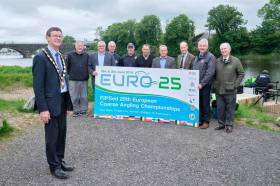Displaying items by tag: Portglenone
Preparations are in full swing at the Glenone Coarse Angling Facility (known locally as Molloy’s Ford) at Portglenone in Co Antrim ahead of the world-renowned European Coarse Fishing Championships, set to take place on the Lower Bann later this month.
It will be the first time that Northern Ireland will host an angling event of this calibre since the World Championships were held on the River Erne in 1992, and the Newry Canal in 1982.
The National Coarse Fishing Federation of Ireland (NCFFI) was awarded the honour of hosting the 25th anniversary of this event by the Fédéracion International de la Pêche Sportive, and has been working closely with the local community to bring the event to this area of Mid Ulster.
The championships are set to be staged around the communities of Portglenone and Bellaghy in the Bann Corridor, an area of outstanding natural beauty where the teams representing 18 nations will be hosted throughout the event, bringing a welcome boost to the local economy.
Significant investment from Waterways Ireland and Mid Ulster District Council and the generosity of local landowners has led to the enhancement of the existing coarse fishing facility to support an angling event of this size.
Chair of Mid Ulster District Council, Councillor Martin Kearney, expressed his delight in anticipation of the forthcoming championships.
“Preparations are almost complete to welcome over 100 anglers from countries all across Europe to the magnificent Lower Bann River at Portglenone-Bellaghy. The site has an established angling heritage as home of a number of large coarse angling festivals, including the annual Bann Bonanza, and our investment will create a River venue capable of hosting further international competitions in years to come.
“We would encourage the local community to come out to welcome the anglers in force at the Parade of Nations, a colourful affair which will see member of local community groups welcome the teams in procession as they make their way from Seamus Heaney Homeplace to the GAA Hall in Bellaghy on Thursday 27 June at 5.30pm.”
Sharon Lavin of Waterways Ireland said the cross-border body is “delighted to welcome so many international visitors to experience exceptional angling along the Lower Bann.
“They will undoubtedly enjoy the new facilities installed along the river at Portglenone and we look forward to working on other similar collaborative projects in the future, in continuing to develop and promote the excellent angling product available.”
Event organiser Jack Tisdall of the NCFFI said: “To host this prestigious event is fantastic news for the coarse angling community as we are providing Ireland with its first world-class angling facility on a river. Further planned developments will support the inclusivity of all in our sport and leave a legacy of angling for the area.”
Teams will train on the venue from Monday 23 to Friday 28 of June ahead of the Parade of Nations on Thursday 27 June where the chair of Mid Ulster District Council will ceremoniously receive the flags from the teams and the championships will be declared open by the president of FIPSed (Fédération Internationale de la Pêche Sportive en Eau Douce) on Saturday and Sunday 29-30 June.
Enthusiasts will be delighted with the opportunity to watch top rods in action on the bank, such as England’s Will Raison and Hungary’s Tamas Walter, as well as team Italy which is currently ranked number one in the world.
For more details of the European Coarse Fishing Championships, please visit the dedicated website HERE.
If you are a local community group who would like to take part in the Parade of Nations, contact Helen Rainsford, NCFFI public relations, on 07711 607 200.
The NCFFI is also appealing to members of all communities for their help in stewarding the event with 100 volunteers are required.
If you are available from 8am to 2pm on the Saturday and Sunday, or both, please visit the event website for more details and to register online.






























































